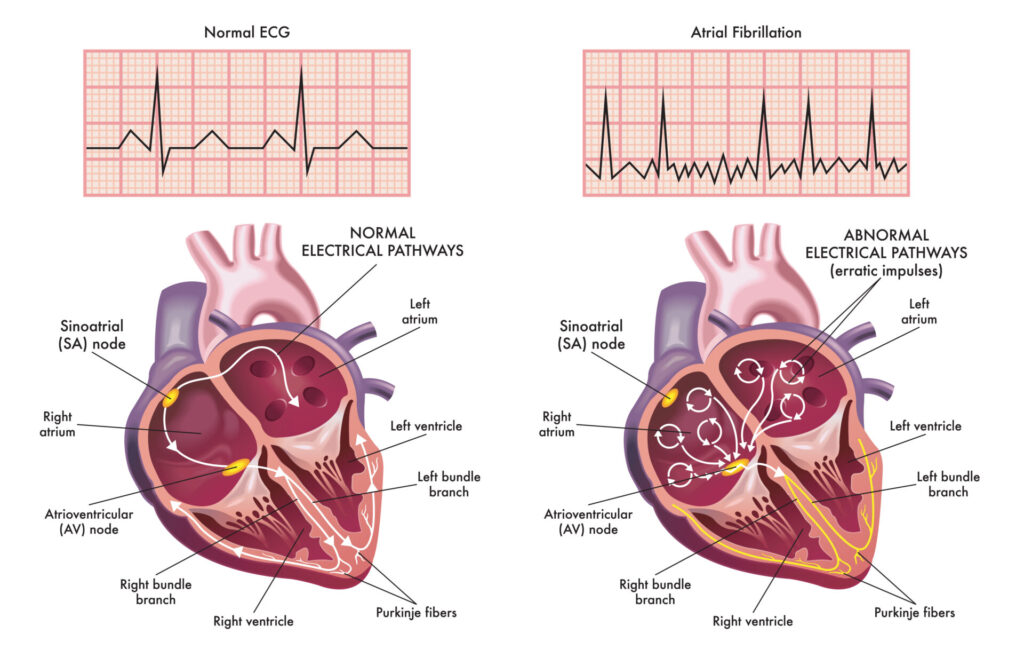Atrial fibrillation, or Afib, is a type of arrhythmia wherein your normal heart rhythm becomes offbeat. Afib can be acute or chronic and is the result of your heart contracting irregularly. If not addressed early, Afib can lead to life-threatening complications.
Normal Heart vs. a Heart with Atrial Fibrillation
Your heartbeat is the effect of your heart muscle contracting and releasing to pump blood throughout your body.
Normal heart – If you have a healthy heart, your pulse occurs roughly once each second while at rest and speeds up when active. A healthy heart can beat anywhere between 60 and 150 times per minute. Each time your heart pulses, it transfers blood from the two chambers at the top of the heart (the atria) to the two chambers at the bottom (the ventricles). During this transfer, the upper chambers also receive new blood as the bottom chambers send blood out to the organs and vessels of the body.
Heart with Atrial Fibrillation – Patients with atrial fibrillation do not experience a heartbeat that occurs roughly once per second. Instead, the heart’s upper chambers contract and release at a much faster pace while at rest. In extreme cases, Afib patients can experience more than 400 beats per minute.
Afib’s fast, irregular pulse interrupts the transferal process of moving blood from the atria to the ventricles, causing blood to pool in the upper chambers. If pooling occurs for too long, patients risk experiencing health- or life-threatening conditions such as:
- Blood clots
- Heart failure
- Stroke
This extreme pace of 400 beats per minute or more overwhelms the chambers, especially the ventricles, which cannot distribute the blood at the same rate that they receive blood. When the ventricles cannot pass blood fast enough, the upper chambers will start to hold too much blood, which causes it to become stagnant. Stagnant blood will begin to clot, increasing the likelihood of a clot making it out of the heart and into an artery. If this happens, the clot could cause an artery blockage somewhere in the body leading to an embolism, or in the brain leading to a stroke.

What to Ask My Heart Doctor About Atrial Fibrillation
Whether you suspect you have atrial fibrillation or are simply curious about the condition, talk to your cardiologist about signs to look out for, risk factors to be aware of, and preventive measures to take to help protect your heart health.
What Are Signs of Atrial Fibrillation That I Should Be Aware Of?
When you and your heart doctor speak about atrial fibrillation, ask them about the signs and symptoms to look out for. In some cases, patients do not exhibit any symptoms of Afib, making it crucial to maintain regular visits with your cardiologist so they can monitor your heart and catch any changes in your heartbeat.
If an Afib patient does exhibit signs or symptoms, they are likely to experience:
- Breathing trouble
- Chest pains
- Fainting and dizziness
- Physical fatigue or weakness
- Racing heartbeats
Am I at Risk of Developing Atrial Fibrillation?
Your heart doctor will be able to review your medical and family history to help determine whether you are at risk of experiencing atrial fibrillation. Be sure to tell your cardiologist about any past medical issues or complications, and answer questions about your lifestyle honestly. This will help your heart doctor form the best treatment or management plan for you.
Common risk factors for Afib include:
- A history of heart issues, including coronary artery disease, valvular heart disease, and congenital heart disease
- Alcohol consumption
- Being 50 or older
- Caffeine consumption
- Diabetes
- High blood pressure
- Kidney or lung disease
- Obesity
- Sleep apnea
- Smoking or using any nicotine products
- Thyroid disease
- Using illicit drugs, especially cocaine or amphetamines

Is It Possible to Prevent Atrial Fibrillation?
When speaking with your heart doctor, ask them what you can do every day to help protect your heart and prevent the development of Afib. Healthy lifestyle choices go a long way and do wonders for your heart health.
Your cardiologist is likely to recommend preventative changes, such as:
- Controlling cholesterol
- Improving diet, especially by lowering your intake of salt and saturated fat
- Improving sleep
- Increasing activity and movement
- Lowering high blood pressure
- Managing diabetes
- Managing stress
- Quitting smoking or tobacco use
Do you have Afib or want to know more about this condition? Talk to the Heart Specialists at Middle Georgia Heart.
Our heart doctors offer exceptional advice, treatment, and care to patients with atrial fibrillation. Whether you require a medication regimen or medical procedure to address your Afib, our team will provide exceptional care at every step. Schedule an Afib consultation with our practice today: 478-207-5224
Recent Articles
4 Winning Facts About Your Middle Georgia Heart Doctors
Your Heart Doctor Said to Change Your Lifestyle. Now What?
When to Talk to Your Cardiologist About Valvular Heart Disease
